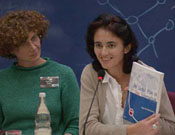
Patricia Kahn and Arachu Castro.
Parliamentary Office of Science and Technology Postnote (PDF)
EMBO reports special issue on the 3rd EMBL/EMBO Joint Conference 2003
Biology is widely and increasingly recognized as the frontier of fundamental research in the 21st century, and as the source of major applications in industry and medicine. Indeed, molecular biology and its applications, biotechnology, have made huge contributions to medical progress in the form of recombinant products, vaccines, a plethora of pharmaceuticals and diagnostics. It would be fair to say that modern medicine would not exist if it were not for modern biology. It is clear that the know-how and technologies that have grown out of basic research in biology have the potential to alter dramatically living conditions of the human species on a planetary scale. Knowledge of the molecular mechanisms of life will increasingly be applied both to eradicate and to control disease, while concern exists that the same knowledge could equally be translated into life-threatening weapons. As a manifestation of our social responsibilities as scientists, this year we decided to focus primarily on 'infectious diseases' and secondarily on 'biological weapons' as the themes for our third joint Science and Society conference.
Infectious diseases remain one of the great causes of human suffering and death in the world. There is an urgent need to develop new means of fighting them, which will require a global mobilization of experts across professional fields. It is imperative to collectively reassess the causes behind huge imbalances in the degree to which different populations of the world are afflicted by infectious diseases. One aim of this interdisciplinary conference is to bring together life scientists, social scientists and decision-makers to review and discuss how best to generate and make available the scientific and economic means to protect humanity from disease-causing infectious agents. Equally, by becoming more aware of the issues and engaging more vigorously in discussions on bioweapons, biologists can also help to ensure that possible threats are considered with the appropriate degree of seriousness. We hope that 'Infectious diseases: Challenges, threats and responsibilities' will help elucidate these complex and important issues.
Fotis C. Kafatos (Director-General, EMBL) and Frank Gannon (Executive Director, EMBO)